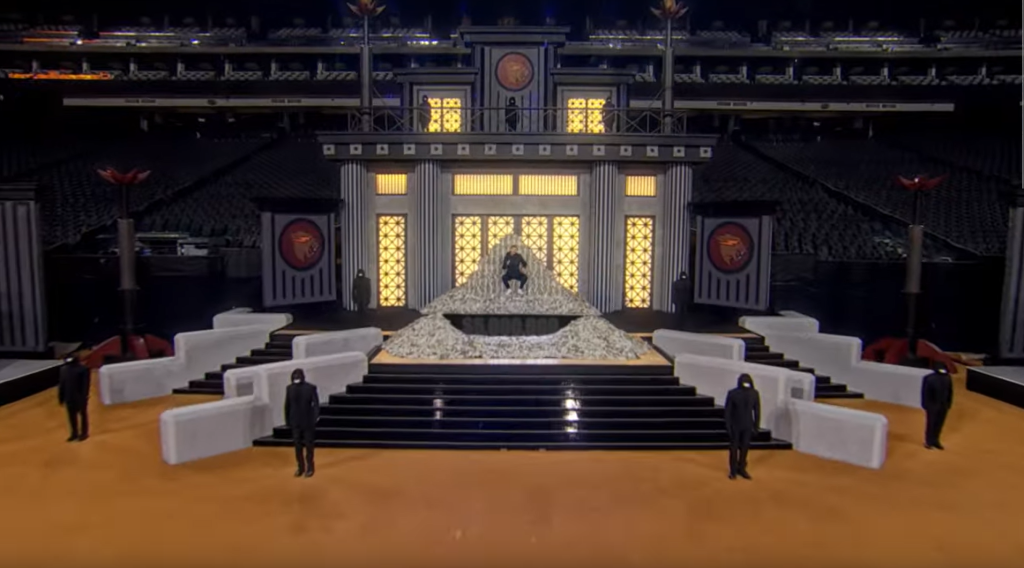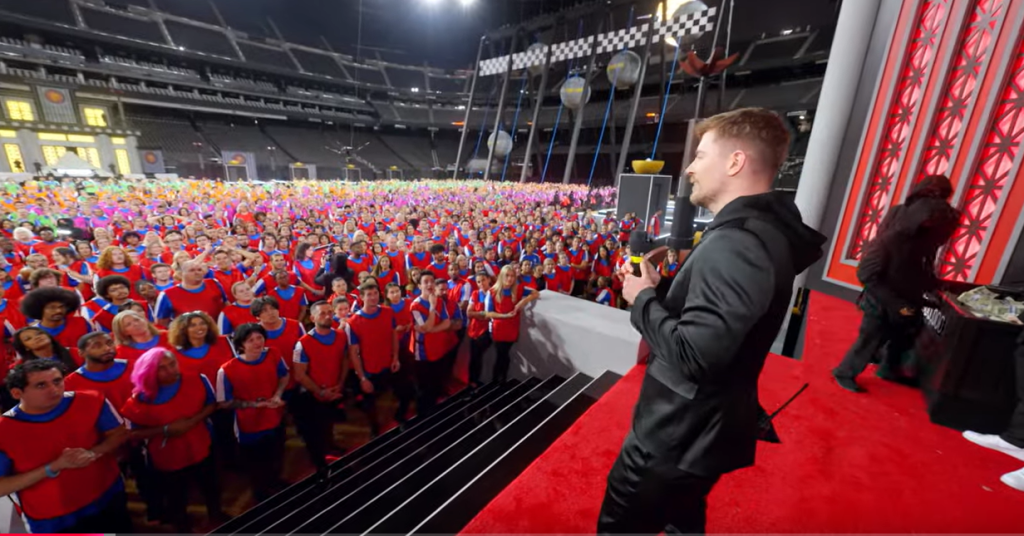MrBeast, Amazon Prime, and the Spectacle of a Devolving Society

Jimmy Donaldson—better known as MrBeast—has a reputation for pushing boundaries. As one of YouTube’s biggest stars, his videos often feature over-the-top stunts, immersive challenges, and grandiose philanthropic gestures. So it’s no surprise that his partnership with Amazon Prime for a new show called “Beast Games” is generating plenty of buzz. The anticipation for this show is palpable, and it’s intriguing to see how deeply it reflects our society’s current trajectory—one that many argue is devolving into spectacle-driven entertainment while becoming more culturally monolithic.
This show, straddling the blurred lines between influencer culture and corporate media, has the potential to reshape the entertainment landscape. From the collective appetite for larger-than-life competition to the rise of dominant conglomerates, ‘Beast Games offers a compelling insight into the evolving dynamics of modern entertainment.
MrBeast’s leap to Amazon Prime is not just significant, it’s monumental in the influencer-to-mainstream pipeline. Once upon a time, YouTube stars had to fight for crossover credibility; now, networks and platforms are coming directly to creators with huge online followings. MrBeast’s brand, which flourished on YouTube thanks to viral challenges and massive charitable stunts, is poised to enter living rooms worldwide via a media giant’s platform, marking a significant shift in the entertainment industry.

There’s a symbolic union here: an influencer whose success is built on extravagant, high-stakes content is joining forces with a corporation that wants exactly that—shows with big, binge-worthy appeal. This also underscores a broader issue: where YouTube once stood as a disruptive force offering democratized content creation, it’s now intertwined with the same corporate giants that shape traditional media. We’re witnessing the consolidation of entertainment options, where a few mega-platforms dominate distribution and production.
Though details remain under wraps, the show’s rumoured format fits neatly into MrBeast’s established style: elaborate, high-concept competitions with huge prizes for contestants who push themselves to their physical, mental, and emotional limits. It’s like digital gladiatorial combat, minus the bloodshed—though the public embarrassment and potential injuries can still be part of the drama. The premise taps into our primal fascination with spectacle, danger, and reward.
This points to a larger societal question: do we need more intense content to stay engaged these days? Reality shows and viral videos have conditioned audiences to expect a steady stream of jaw-dropping, click-worthy thrills. As such, “Beast Games” seems tailor-made for a culture that demands spectacle.
Critics argue that our collective appetite for these extravagant displays signals a broader social devolution, where genuine connection and nuanced storytelling take a back seat to adrenaline-pumping visuals. Viewers are offered an immediate dopamine hit but rarely get anything more profound. Others see it differently: MrBeast’s charitable background suggests these competitions might serve a higher purpose, possibly leading to large-scale philanthropic initiatives. Still, the question remains whether such philanthropy will survive inside a slick, corporate production that aims for mass appeal and global viewership.
The success of “Beast Games” underscores how a handful of giant corporations—Amazon, Google, Meta, Netflix, and Disney—are increasingly shaping our entertainment diet. They can afford to produce and heavily promote a select number of big titles, which inevitably become global phenomena. Even the illusion of infinite choice on these platforms is often overshadowed by a few marquee shows that get top billing.
This raises the issue of monolithic culture. On paper, we have more content available than ever. Significant platforms are incentivized to funnel audiences toward blockbuster-type productions that draw huge numbers. Independent creators and niche voices remain buried under algorithms designed to spotlight the shows promising the most significant investment return. When “Beast Games” premieres, expect it to dominate your home screen, ads, and social feeds, reinforcing the cycle of attention on a single piece of content rather than a diverse range of media.

“Beast Games” might also mirror the daily pressures many of us feel. Even if we’re not vying for a million-dollar prize, we live in a world of constant performance—curating our social media presences, chasing likes and follows, and trying to stand out in a hyper-competitive landscape. Reality-based spectacles thrive because they tap into our fears, ambitions, and desires for quick validation.
In this sense, the show can be read as entertainment and metaphor. It offers a glossy, dramatic version of our challenges—though ours lack the glitz and camera crews. Viewers can enjoy the schadenfreude or root for the underdog, all while feeling that they, too, are part of the broader game of modern social life.
“Beast Games” epitomizes our cultural crossroads today: a blend of influencer-driven spectacle, massive corporate backing, and a public eager for sensational new thrills. Some critics see it as a harbinger of further social decay, where spectacle replaces substance. Others view it as a natural evolution of the entertainment industry and a testament to the power of online creators to reshape mainstream media.
As ‘Beast Games’ looms on the horizon, promising to dominate screens and social conversations, it presents a unique opportunity. Whether you’re intrigued by the prospect of epic competitions and charitable tie-ins or concerned about its place in a culture increasingly fixated on spectacle, one thing is certain: this show is a catalyst for thought and discussion. It has already made waves, reflecting our collective hunger for the next big thing in entertainment, even if it comes at the cost of more profound, more diverse storytelling.










